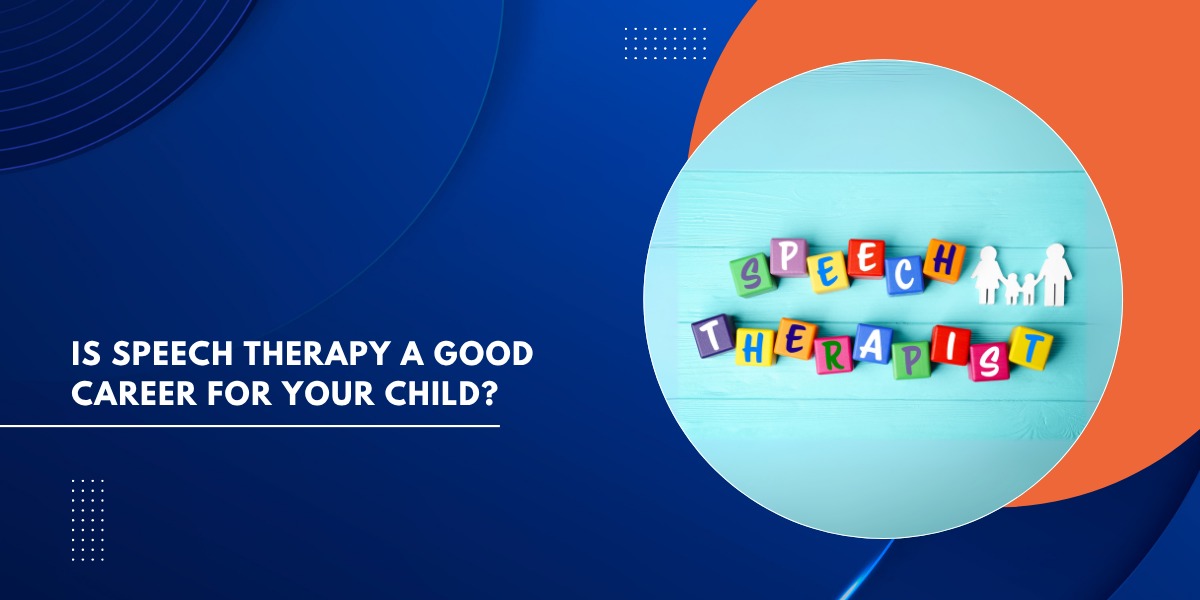A few months ago, I spoke with Neha from Bangalore, whose daughter, Ananya, had just completed her 12th board exams. Ananya was compassionate, patient, and naturally drawn to helping others, but she wasn’t sure how to turn those qualities into a career.
“She doesn’t want to do engineering or medicine,” Neha told me. “But someone recently mentioned speech therapy — and we’re wondering… is that really a career path worth exploring?”
I’ve had this conversation many times—with parents, with students, even with school counselors. For some reason, speech therapy still flies under the radar when we talk about meaningful and future-ready careers. And yet, the need for qualified speech therapists in India is growing every single year.
Whether your child is in high school, considering undergrad options, or simply unsure about what direction to go in, it’s worth exploring what this field is really about and what kind of child would genuinely thrive in it.
In this guide, I’ll walk you through what speech therapists actually do, the skills and traits that make someone suited for the role, the course path, job options, salary range, and the future scope in India.
Let’s explore if speech therapy could be the right fit for your child—and why this path deserves more attention than it gets.
Why Speech Therapy Is Becoming a Smart Career Choice?
Over the past few years, speech therapy has gone from a quiet, behind-the-scenes career to one that’s gaining real attention. More parents, schools, and students are starting to talk about it, and it’s no longer something only specialized clinics offer.
Here are three big reasons why speech therapy is becoming a career to watch, especially for students who are empathetic, observant, and have a natural passion for helping others:
1. People Are Talking About Communication Delays More Than Ever
When I first started in this field, many families had never even heard of early speech intervention. Today, it’s one of the first things parents consider if their child isn’t speaking on time, and that’s a really positive shift.
As awareness grows, so does the demand. Schools, pediatricians, and even corporate wellness programs are now referring people to speech therapists more actively. This means the career has moved beyond traditional clinics and into schools, homes, hospitals, and community spaces, creating more opportunities for professionals entering the field.
2. It’s Not Just a Clinic Job Anymore
Speech therapy is no longer just about sitting in a clinic with a child for an hour. It’s much more dynamic today.
Some therapists are working in international schools, others are conducting online therapy sessions with clients across the globe, and some are collaborating with tech startups that create apps for kids with speech delays. Plus, there are those running their own private practices, offering flexible hours, and making a real impact in their communities.
3. No AI or App Can Replace Human Connection
This is the part that makes me truly believe speech therapy will remain relevant — forever.
While many services can be automated today — like banking, shopping, and even tutoring — you can’t automate human connection. A robot can’t understand a child’s hesitation or cheer when a child says their first full sentence. As a speech therapist, you’re doing work that stays deeply human, and that’s something no technology can replicate.
Takeaway
So, if you’re still questioning whether speech therapy is a legitimate career path, I’ll tell you this: not only is it real, but it’s also thriving. This field is growing with impact, flexibility, and job security.
If your child listens more than they speak, is quietly empathetic, and wants to make a meaningful difference in others’ lives — speech therapy could be their perfect calling.
Career Spotlight: Is Speech Therapy a Smart Career Choice for Your Child?
Speech therapy’s quietly become one of those careers more parents are starting to notice — and for good reason. The demand is growing like never before, especially with more kids being diagnosed early and schools finally stepping up their support systems. Plus, it’s a career that blends science, empathy, and real impact — not a bad combo.
1. Hospitals and Clinics: Where compassion meets career stability
In clinical settings, speech therapists help stroke patients speak again, support kids with speech delays, and work alongside neurologists and ENT doctors. The work is meaningful, and the job stability is solid.
Example: At places like Apollo or Fortis, freshers start at around ₹3–5 LPA, but with a Master’s and 3–5 years of experience, salaries can go up to ₹8–12 LPA. Therapists trained in specialized methods (like PROMPT or feeding therapy) often command even more — especially in private clinics across metro cities.
Takeaway: A few of my students who did BASLP (Bachelor of Audiology and Speech-Language Pathology) and followed it up with a Master’s are now working in rehab centers in Delhi and Bangalore, earning lucrative salary packages along with other perks. One even launched her own private clinic after a few years. If your child has patience and enjoys helping people one-on-one, this is a rewarding and respected career path — both emotionally and financially.
👉 If your child’s drawn to healthcare but doesn’t want to go the MBBS route, speech therapy is a solid, people-focused alternative.
2. Schools and Startups: Therapy’s Going Digital — and Your Child Could Lead That Change
These days, therapists aren’t just in hospitals. Many are working in inclusive schools, helping children with autism, speech delays, or learning challenges. Then there’s the rise of EdTech and teletherapy — therapists are now building apps, running virtual sessions, and reaching families across the country.
Example: Schools like The Gateway School in Mumbai, or platforms like 1SpecialPlace and PlayStreet, hire therapists to work both on-site and remotely. Salaries can range from ₹4–10 LPA, depending on experience. And yes, some roles come with the flexibility to consult part-time or work from home.
Takeaway: One of my students started in a school in Chennai, moved into a therapy-tech startup, and now designs digital therapy content for kids across India. If your child’s creative, tech-comfy, and likes working with kids, this path offers a nice mix of structure and freedom.
👉 If your child’s the kind who bonds easily with kids, enjoys psychology, and likes figuring things out, this career offers purpose, flexibility, and growth.
3. School Inclusion & Therapy Startups: Speech Therapy Is No Longer Just a Hospital Job
The field’s shifting. Today, speech therapists aren’t just working in hospitals — they’re shaping education policies in schools, consulting for therapy-focused startups, and even going solo with private online practices. That mix of flexibility and impact is what’s pulling more students toward this field.
Example: Schools like Podar and Oakridge hire speech therapists for ₹4–7 LPA, while therapy-focused EdTech startups like 1SpecialPlace or Clapingo offer ₹6–10 LPA for therapists who can run engaging virtual sessions. In private practice, therapists who build a loyal client base can earn well beyond ₹12 LPA — especially in metro cities where demand is high.
Takeaway: I know a student who started with school-based therapy in Pune, then slowly built an Instagram page, took a few teletherapy clients — and now has a thriving independent practice. If your child’s the kind who likes working one-on-one, wants flexibility, and is open to entrepreneurship, this career path gives plenty of room to grow.
👉 If your child wants a healthcare career with room to innovate, pivot, and work independently, speech therapy has real potential.
Organizations Actively Hiring Speech Therapists:
- 1SpecialPlace (Teletherapy)
- The Gateway School, Mumbai (Inclusion)
- Rainbow Hospitals (NICU Feeding Therapy)
- PlayStreet
- Podar
- Oakridge
- Clapingo

Job Market Pulse & Policy Trends in India
The demand for speech-language pathologists (SLPs) in India is on the rise, driven by increased awareness and a growing need for early intervention in communication disorders. A 2016 report by the Union Ministry of Statistics and Programme Implementation estimated that approximately 1.87 million citizens in India suffer from speech and communication disabilities . This has led to a surge in opportunities across various sectors, including hospitals, schools, and rehabilitation centers.
The Indian government has recognized the importance of allied healthcare professions, including speech therapy, by establishing the National Commission for Allied and Healthcare Professions (NCAHP). This body aims to regulate and standardize education and practice in the field, ensuring quality services and professional growth.
With the speech therapy services market in India projected to reach USD 2,558.7 million by 2030, growing at a compound annual growth rate of 9.8%, the profession offers promising career prospects for those passionate about making a difference in people’s lives.
In short, the demand is growing faster than the supply. If your child is even slightly curious about this field, now’s the time to explore it seriously.
Why Speech Therapy Is Quietly Becoming a Hot Career in India?
With more parents seeking early intervention, schools adding special educators, and awareness about developmental delays improving, the need for trained speech therapists is growing fast. This isn’t just a “noble profession” anymore — it’s also a smart career move.
Projected Growth: According to reports from India’s Ministry of Social Justice and NEP-aligned school policies, the demand for special educators and therapists (including speech-language pathologists) is expected to grow steadily over the next decade.
A report by The Hindu states that India has five million people with communication disabilities — making it a promising field for speech therapists to build a successful career while pursuing their passion.
In-Demand Roles: Hospitals, early intervention centers, inclusive schools, and even international schools are actively hiring BASLP/MASLP grads. Roles like language intervention specialists, feeding therapists, and AAC consultants are picking up.
Skill Gaps: Here’s the kicker — there just aren’t enough trained professionals. Some private therapy centers in Mumbai and Bangalore have been trying to fill therapist roles for months, offering flexible hours, remote options, and higher pay to attract talent. One well-known child development center even raised their salary offer by 35% to lock in a skilled therapist with pediatric experience.
Takeaway: This field has more demand than supply right now. So if your child is even slightly inclined toward psychology, language, or helping others communicate better — it’s worth exploring seriously.
Industry-Level Observations: Speech Therapy’s Growing Demand and Future Potential
1. Shortage of Speech-Language Pathologists (SLPs)
The demand for qualified speech-language pathologists (SLPs) has been steadily increasing over the years, but the supply of trained professionals has struggled to keep pace.
According to a report from the Indian Speech & Hearing Association (ISHA), there is a significant gap between the number of trained SLPs and the number of people in need of services. This shortage is particularly acute in Tier-2 and Tier-3 cities where many communities still lack access to proper speech therapy.
The growth in awareness about communication disorders, especially early intervention in children, has contributed to the rise in demand for SLPs. However, educational institutions haven’t been able to produce enough graduates to meet the needs of the population.
2. The Rise of Teletherapy
Teletherapy, or providing speech therapy services remotely via video calls or online platforms, has seen a significant rise — particularly in the wake of the COVID-19 pandemic.
According to data from 1SpecialPlace, the demand for teletherapy has skyrocketed, with therapists now reaching clients from smaller towns and even international locations.
The flexibility and convenience of teletherapy have also attracted a new wave of therapists, especially younger professionals who value the ability to work from anywhere, allowing them to manage their time better and even serve clients globally.
3. Salary Ranges and Job Stability
The salary range for SLPs varies depending on experience, location, and specialization. Fresh graduates can expect to earn around ₹3–5 LPA in hospitals or rehabilitation centers, while those with specialized certifications (such as PROMPT, feeding therapy, or pediatric speech therapy) can earn higher salaries, often ranging from ₹6–10 LPA.
As professionals gain experience (3–5 years), salaries can increase to ₹8–12 LPA, especially in metro cities like Delhi, Bangalore, and Mumbai.
Experienced therapists who build a loyal client base or run their own clinics often earn upwards of ₹12 LPA, with some reporting even higher figures in major urban centers.
The job stability for SLPs is strong, as the healthcare and education sectors continue to expand their need for specialized therapists. As more schools and educational institutions hire in-house therapists, job opportunities for SLPs are expected to increase, not only in urban areas but also in under-served regions.
Takeaway
The speech therapy industry is thriving, and opportunities are plentiful. With a shortage of qualified SLPs and the rising popularity of teletherapy, the field offers a promising career path with job security and the potential for a good salary. Whether working in a hospital, school, or as a private practitioner, the demand for trained professionals is expected to grow exponentially in the coming years.
Where NextMovez Comes In: Turning Interest into a Clear Career Plan
Most parents don’t have speech therapy on their radar — and that’s exactly why some students miss out on this underrated but growing career. That’s where we come in. At NextMovez, we help students figure out if this career fits into their Best-Fit Career Zone™ — and if it does, we show them how to get there with clarity.
We don’t just name courses. We walk students through:guidance
- What degrees they’ll need (like BASLP or MASLP)
- What real therapists actually do all day
- Which specializations are in demand (like pediatric or neuro-rehab)
- How to pick between a stable job and private practice.
We’ve worked with students who started with zero exposure to therapy careers — and are now working with top schools, hospitals, or even running their own clinics.
Takeaway
I’ve seen kids with a quiet interest in psychology or biology find their zone in speech therapy — not because they knew everything from day one, but because they had . That’s exactly what we offer at NextMovez: clarity, direction, and a plan that actually fits your child.
Want to explore the exact education path for speech therapy? Read our BASLP Career Guide here.

Emerging Skills That Actually Matter in a Speech Therapy Career
Let’s be real — just having a degree isn’t enough anymore. What really counts is how your child shows up in the therapy room (or Zoom call), how well they connect with kids and families, and how quickly they can adapt to new tools or situations. The good news? These skills can be learned — and they’ll make all the difference.
1. Language Tools & Foundations: Every Therapist Needs a Strong Base — And This is Where It Starts
What to focus on:
- How kids pick up language (and what happens when they don’t)
- Tools like PECS, PROMPT, and SCERTS that help non-verbal kids communicate
- Supporting kids who speak more than one language
- Understanding autism and how it affects speech
Example:
At places like Ummeed in Mumbai, therapists work with toddlers who barely say a word — and over time, help them express themselves clearly. It’s slow progress, but powerful stuff.
Why it matters:
This is where most therapists start — and where the real impact happens. If your child learns how to use the right techniques early on, they’ll walk into their first job with confidence.
2. Teletherapy and Tech: Therapy Isn’t Always Face-to-Face Anymore
What to focus on:
- Running therapy sessions online (yep, even with toddlers)
- Using communication apps like Avaz or Proloquo2Go
- Recording sessions, tracking progress, and sharing updates with parents
- Making therapy feel personal — even through a screen
Example:
Therapists working at online-first clinics like 1SpecialPlace are helping kids in smaller towns get the same support as those in big cities — all from their laptops.
Why it matters:
Your child doesn’t need to become a techie — but they do need to get comfortable using tools that make therapy easier, especially in a digital world.
3. Feeding Therapy: A Niche Skill That’s Always in Demand
What to focus on:
- Helping babies and toddlers with swallowing or eating issues
- Supporting kids with conditions like Down Syndrome or cleft palate
- Working closely with pediatricians and OTs
- Building trust with anxious parents
Example:
In children’s hospitals like Rainbow, feeding therapists are a lifeline — especially for newborns in the NICU.
Why it matters?
Not every therapist goes into feeding, but those who do? They’re booked out and well-paid. If your child’s interested in early childhood or medical settings, this is a smart move.
4. Teamwork and Planning: Therapy Isn’t a Solo Act
What to focus on:
- Collaborating with teachers, doctors, and psychologists
- Writing clear therapy goals and progress notes
- Talking to parents in a way they actually understand
- Helping schools create IEPs (Individualized Education Plans)
Example:
In schools like The Gateway School, therapists are part of every classroom strategy — not just someone who pops in for a 30-minute session.
Why it matters:
Great therapists know how to work in a team. If your child learns how to plan smartly and communicate well, they’ll stand out wherever they go.
5. Patience and People Skills: The Stuff You Can’t Learn from a Textbook
What to focus on:
- Building trust with kids who don’t talk — yet
- Knowing when to push and when to back off
- Adjusting on the fly when a session doesn’t go as planned
- Being consistent, even when results take time
Example:
I know a therapist who once spent five sessions just getting a child to sit down and stay in the room. Now that same child speaks full sentences. That’s the job.
Why it matters:
These soft skills? They’re everything. The therapists who connect best — not just diagnose — are the ones families remember and recommend.
Future Outlook and Predictions
Speech therapy is changing — and fast. With early diagnosis becoming more common, EdTech platforms growing like crazy, and mental health finally getting the attention it deserves, the next 10 years are going to open up some seriously interesting paths for future therapists.
Here’s where things are headed:
Teletherapy isn’t going anywhere — in fact, it’s expanding. Therapists who can deliver high-quality online sessions will have access to clients across cities, states, and even countries.
Specializations like AAC, feeding therapy, and autism-focused intervention are already in short supply — and demand is only going up.
Inclusive education is pushing more schools to hire in-house speech therapists, and not just in metros. Tier-2 and Tier-3 cities are catching up fast.
Private practice is getting a digital upgrade — with therapists running branded Instagram pages, offering therapy packs, and setting up virtual clinics.
Global demand is growing — countries like Canada, Australia, and the UAE actively recruit speech therapists from India, especially those with international certifications and experience.
Some speech therapists are even collaborating with AI developers to build personalized voice libraries for speech assist tools — showing how tech and therapy are intersecting.
Tech and therapy are intersecting — some speech therapists are even collaborating with AI developers to build personalized voice libraries for speech assist tools, demonstrating how technology is enhancing traditional therapy practices.
Takeaway: Speech therapy is no longer just a “safe” job — it’s turning into a career where you can specialize, build a niche, go independent, or even take your skills abroad. If your child starts learning the right tools and techniques now, they’ll be ready for roles that don’t even exist yet.
👉 Don’t let an overlooked career become a missed opportunity
References and Resources
- National Education Policy 2020 (NEP) – Highlights on inclusive education
- Indian Speech and Hearing Association (ISHA) – Official body governing SLPs in India
- Rehabilitation Council of India (RCI) – Regulatory body for speech and hearing programs
- Ummeed Child Development Center, Mumbai
- India’s Ministry of Social Justice and Empowerment – Disability resources and reports






















